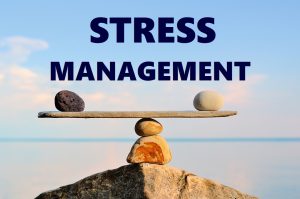Stress is an inevitable part of life, but overexposure to it can have serious health ramifications. Employing healthy techniques such as mindfulness, exercise, nutritious eating habits and quality rest can help alleviate long-term stress levels.
Learn to recognize physical warning signs like tight muscles and headaches as well as emotional ones such as irritability quickly – and find ways to quickly relieve them so as to stop the progression into full-scale stress responses.
1. Turn off the TV
Stress is an integral part of life, yet prolonged or persistent exposure to it can severely hinder your ability to think clearly and complete daily tasks effectively. Furthermore, chronic stress increases your risk for chronic diseases.
Finding and managing stress triggers can be tricky, particularly if they’re hidden within everyday activities like driving and grocery store lines. If driving makes you anxious, try taking another route to work or shopping online instead – perhaps take an alternative route or order online?
Tv can provide a welcome distraction, yet can also add to feelings of anxiety and depression. When used as an escape mechanism instead of other more healthy activities such as exercise and socialization, TV may become an unhealthy replacement. If this describes your viewing habits, keeping a log may help break them. And if lowbrow entertainment such as reality shows dominates your schedule too often – consider seeking professional assistance immediately.
2. Listen to Music
Stressful environments include noise, financial concerns, demanding jobs and family matters. Some common signs of stress include irritability, headaches, fatigue, indigestion and poor sleep; depression could also be present – to effectively address it and manage it more efficiently it’s important to identify its source.
One effective way to alleviate your stress level is through listening to relaxing music. Studies have revealed that certain genres can lower heart rates, activate the parasympathetic nervous system (also referred to as the “rest and digest” system) and thus decrease cortisol levels. Listening to soft piano melodies, acoustic tunes or nature sounds can all provide soothing relaxation effects.
Stress relief through laughter is another effective strategy. If you find yourself anxious or fretful, read a funny book, watch a comedy film or hang out with people who make you giggle and find ways to laugh together – this will also help restore your natural state of peace and tranquility.
3. Exercise
Stress is an inevitable part of life, but keeping it under control is vitally important to overall wellness. Too much stress can weaken your immune system and cause unpleasant physical symptoms like headaches and stomach upset.
Stress relief strategies include meditation, social support from friends and family, eating healthily, sleeping well and engaging in physical exercise – with exercise being one of the most effective tools against stress according to a college students study.
Every exercise can help reduce anxiety and tension; adding mindfulness into your workout may make it even more effective. Focus on the sensations of touching the ground or breathing instead of thinking about all that’s going on around you – your body will then send signals of calm that break the cycle of anxiety and tension, helping break it. This form of autoregulation exercise is called deep breathing or muscular relaxation exercises to learn techniques.
4. Take a Bath
Stress is a part of life, but chronic anxiety can become problematic. Luckily, there are various methods of relieving tension around the house to alleviate it and alleviate symptoms of anxiety.
Yoga, deep breathing and meditation are excellent methods of relaxation that activate the body’s rest response – the antithesis of fight or flight stress reactions. This can help calm both mind and body while relieving symptoms such as headaches, stomachaches and muscle tension.
Talking with someone you trust can also help reduce stress levels. If you find yourself becoming overwhelmed, reach out for a chat or coffee date with someone.
Establishing a routine is another effective way to reduce stress. From getting up at the same time each morning or maintaining an evening sleeping schedule, creating a rhythm that can be followed makes the body more resilient to stressful circumstances.
5. Go to Bed
Although you are powerless over certain elements in life (bills won’t stop coming, there will never be more hours in a day and work responsibilities are always present), you do have some power to change how you respond to these challenges. Learning healthy coping mechanisms and stress relief techniques may help put more control into your hands and improve quality of life.
If your current attempts at managing stress aren’t helping, consider speaking to a professional counselor or therapist. A therapist can assist in pinpointing the source of your anxiety while giving you new ways to cope.
Stress is an inevitable part of life, but chronic or excessive levels can become harmful. If you’re experiencing physical or behavioral symptoms of stress such as headaches, difficulty concentrating, stomach upset, apathy or changes in appetite – schedule an appointment with your primary care provider immediately! There are also plenty of ways to relax at home from taking a relaxing bath to trying an app like Calm or pranayama breathing techniques.




